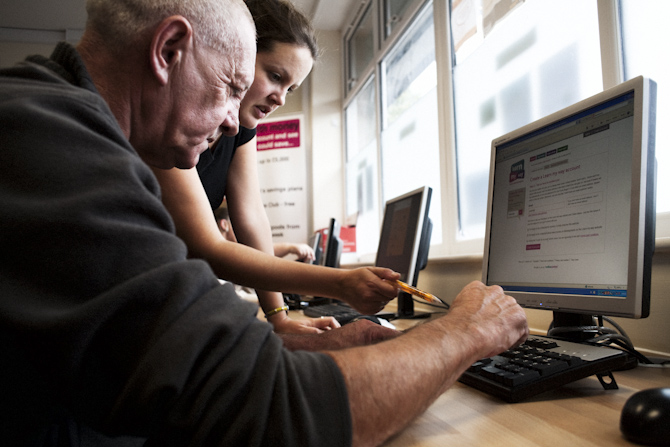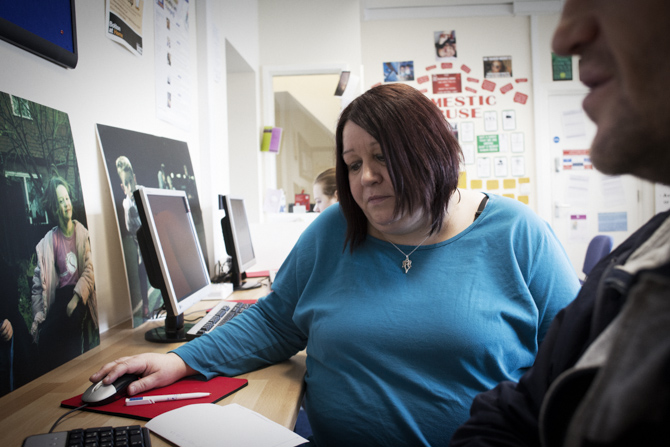We’re all sat in the front room, practically eating our lunches off mouse mats – the computers and keyboards take up most of the available desk space.
Carl is closest to the front door and jumps up each time there’s a knock. “We’re open again at half past,” he repeats politely, “we’re just getting ourselves something to eat. Are you all right to come back in half an hour? Great, see you later.”
Between mouthfuls of pasta from a plastic tub, Vanessa, the UCAN manager, tells me that the afternoon is set aside for an IT class. “It’s very relaxed,” she says. “We’ve discovered that a drop-in works better than a formal course. Customers don’t have to stay for the whole session – which can feel daunting – but most of them do.”
“If people can get to know how the computer works then they are more likely to access services online. If we are being posh, we’d call it digital inclusion.
“Last year the government changed the way jobseekers look for work. All new jobseekers now have to set up a government online account – which is challenging enough – and then upload a CV before they can start looking for a new job.
“The theory is great if you are IT savvy,” she says. “But when you mention uploading a CV to some of our customers you might as well be talking a different language.”
“So, if someone finds themselves out of work,” I say, “it could be several weeks before they are able to learn the necessary IT skills to apply for another job?”
“Yes, some have never touched a keyboard before,” says Vanessa, “and it was bedlam in here when it was first introduced. People were dead nervous.
“The CV is now the Willy Wonka golden ticket,” she says. “Gone are the noticeboards in the Jobcentre, all the available vacancies are now online on what’s called the Universal Jobmatch. And the Jobcentre can now check whether you’re actively searching for a job and impose sanctions if you’re not.”
As plates and mugs find their way back to the kitchen sink, freelance IT tutor Charlotte, arrives and within minutes four participants follow and settle themselves in front of a screen. I explain to Charlotte and her class about this blog, “I’d like to take some pictures if that’s okay with everyone, and maybe ask a few questions.”
“Paul is one of our star pupils,” says Charlotte, pointing out an older man who has already logged on. So I start with Paul.
“Seven months ago I was made redundant from my job as a driver,” he says. “For ten years the only computer I’d used was the sat nav! I didn’t even know how to switch one on.”
After coming to a few Monday afternoon sessions Paul says he found his way round the PC. “It’s no problem now. I’m starting a new job tomorrow and they asked if I could use a computer and I said I could. So I’ll be doing some forklift truck driving and keying in goods in and goods out, that sort of thing. They’ll show me what to do, won’t they?”
“I’m sure they’ll give you some training before they let you loose,” I say. “Do you mind me asking, how old are you Paul?”
“61.”

Another older man comes in as I’m talking to Paul and I overhear him tell Charlotte that he needs some help uploading his CV onto the Universal Jobmatch site. “That’s fine,” she says, “and it’s something I can help you with but I try and start everyone off with a little online course about finding their way around the keyboard. Are you okay if I set you off with that first?”
I walk through a bunch of teenage boys – and a cloud of marijuana smoke – to get to the front door this morning. Judging by the looks I get from those sitting at the nearest computers, some of the smoke follows me inside.
It’s only 9.30 and, as ever, the front room is already busy. Five of the eight computers are in use and I see job applications, emails and some online learning on the screens as I make my way to the back offices.
The UCAN isn’t open to the public every day but on these open access mornings Rosanne and Carl deal with a torrent of enquiries that sees them flitting from customer to customer, trying to keep all the plates spinning.
This morning I’ve decided to shadow Rosanne for as long as I can keep up, to get an idea of her role as a UCAN project officer.
By the time I have my notebook in hand she is already helping a young woman at one of the computers.
“How do I send this now?” asks the young woman. Rosanne points at the screen and reminds her how to send the email, an application for a job. “Brilliant. Thank you.”
Another woman is standing in the middle of the room, waiting her turn. “Do you know what I do with this?” she asks, holding out some papers.
Rosanne scans the form and passes it back, “Next, you need to list everyone who is moving with you. Then please let me see it again before you send it. Do you need an envelope?”
Back in the small office from which Rosanne keeps on eye on comings and goings there is a small huddle of colleagues. Vanessa is leading a discussion about the homeless alcoholic man who is frequently outside their parade of shops. Minutes later the huddle breaks and Rosanne is out into the front room again.
“Hiya, are you all right?” she says to a man who has just side stepped the ‘cannabis crew’.
“Can I use the phone please?” he asks. “Do you have the number for Jobseeker’s?”
As Rosanne’s pointing out the numbers pinned up above the customer phone, another man is signing in, the front door barely having had time to close. This customer wants to use a computer.
“You might be better off with this one,” she says, directing him to one of the computers which is less temperamental. These machines get a lot of use and some are more reliable than others.
It’s not always clear to me which customers are new to the UCAN as Rosanne treats everyone as if she has known them for years. But within minutes – and after she has exchanged pouches with a colleague delivering the internal mail – she is telling this new arrival about the Tuesday job club which suggests he’s not a regular. “And then there’s the Clear Aims course which is brilliant,” she says. “Cath here can tell you more about that, if you’re interested.”

Next Rosanne is answering the telephone. “Half past 12,” she says to the caller. “Then work club from 1.30 til 4.00. Okay, see you then.”
She comes off the phone, beaming. “Why so happy?” I ask.
“That woman on the phone was referred by the Jobcentre. She was told to ask for Rosanne because ‘she’s fantastic’!”
A young mum has just appeared at the office door, gently pushing her daughter in front of her. “She’s starting nursery this afternoon, at the big school,” she declares. “Show Rosanne your uniform, Kelly.”
Kelly proudly peels back her coat to reveal a brand new blue sweatshirt. Rosanne makes a fuss over the little girl and she and her mother leave happy, only to be replaced by a middle-aged woman who looks as if she hasn’t slept in days.
“I’m being made redundant, Rosanne,” says the newcomer, barely able to contain her tears.
“Come and sit down,” says Rosanne, offering the only other chair in the room.
“Can I make you both a brew?” I ask as the office door is closed behind them. I’ve managed about 15 minutes.


